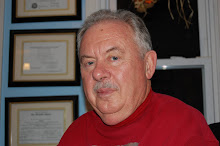The end of an era
Today, August 19, I received an e-mail from an old family friend in Colorado. He wrote to tell me that Mary Clark, known to us as Grandma Clark, a Navajo, had passed away two weeks ago. This man and his brother collected her body at the funeral home and took Grandma Clark to Red Mesa Arizona where she would be buried. The young men's father had come to the Navajo Reservation in the 1960s and wanted to build a home on the Reservation. It was necessary to have tribal permission for such a move and such decisions often took several months. A long process of consensus had to take place. Everyone in the area would have opportunity to express how he or she felt about the decision. At the end of the process, the matriarch of the area, Mary Clark, announced the decision that the family could come to the Reservation.
In my home today I have pictures taken of Mary Clark back in the sixties. She was old then, but according to the records of the Cavalry, she must have been around 102 years of age when she died. Mary Clark never became a believer nor did any of her extended family even though they had contact with missionaries and Christian workers for fifty years. Mary Clark is one of those people whom God chose to accomplish his will but who never came to a saving relationship with the true and living God. Hundreds of Navajos came to Christ because of Mary Clark's decision.
I remember on one occasion that Mary Clark had been bitten by a dog. A missionary who had been a medic in Viet Nam offered to sew up the cut. He broke his needles on her leather-like skin. She screamed in pain when he tried to push the needles through. Eventually he had to take a pair of pliers to get the needle through. When the process was over Mary Clark thanked the young man.
Growing up Mary Clark experienced a very rigorous life. Her father had lived through the attacks of the U. S. Cavalry. Kit Carson came to the Navajo Reservation and massacred hundreds of Navajos. Thus whenever I hear of the great things Kit Carson did, I want to spit in disgust. Mary and her siblings had to run several miles through the snow, jump in an ice-covered pond and then run back to the Hogan while being soaking wet. Her father believed that the Navajos would only survive if they were tough.
As was done all over the United States the Native Americans were driven off their lands so that we good white folk could have the land and the wealth that it possessed. But the government decided that the desert land on which the Navajos lived was worthless. So the Navajos were allowed to keep their homeland.
Today oil, gas, coal, and uranium have been discovered. The wealth was not given directly to the people. Instead it was put into schools, roads, and scholarships for college. This wise use of the money helped the Navajos to be a prosperous people while other Native American tribes were facing serious crises. I felt a special thrill when I saw a huge LeTourneau earthmover being driven by a Navajo. He was in an air-conditioned cab and was hauling coal out of an open pit to fuel an electric power plant. The earthmover had electric wheels that received their power from a generator driven by a huge diesel engine.
Mary Clark lived to see all these changes. Many of the old ways that were good have probably passed away.

No comments:
Post a Comment